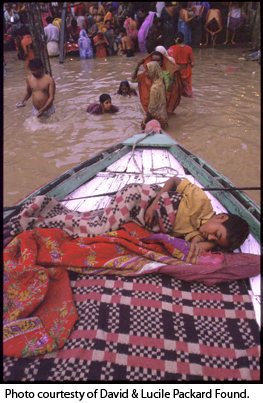Aunt Frieda’s Calamity and the World’s Toilet Crisis
|

On an outing long ago with my Aunt Frieda, I needed to use the bathroom.
This struck her as a calamity because she had a horror of public bathrooms, and she was frantic about me not touching any surface in the rather nice and clean department store rest room. Like most public bathrooms in the US, it had private stalls, flushable toilets, hot water, and soap.
What a chasm between those toilets and the fields, river banks, and road sides that are the only places available for defecation in many parts of the world. To a woman or child from a poor community in Africa or Asia, that bathroom that to Aunt Frieda was a calamity would be a lavish wonder.
These disparities - and the resulting toll on children and communities - are highlighted today in a special series of articles published in PLoS Medicine. Collectively, the articles examine how water, sanitation, and hygiene are crucial interventions to improve health, success in schools, and economic development.
Each of the articles is worth a read: Jamie Bartram and Sandy Cairncross comprehensively tally the health and social costs that result from lack of attention to hygiene, water, and sanitation; Paul Hunter, Alan MacDonald, and Richard Carter address the importance of maintaining and sustaining adequate water supplies; Duncan Mara, Jon Lane, Beth Scott, and David Trouba review successful approaches to sanitation; and Sandy Cairncross, Jamie Bartram, Oliver Cumming, Clarissa Brocklehurst outline what needs to be done to make rapid progress.
The fourth article is particularly valuable in mapping out an Agenda for Action with detailed recommendations for all the diverse stakeholders who can help advance solutions.
All the authors underscore the essential role of health leaders as advocates for WASH interventions and the imperative for collaboration between the health and WASH sectors. If you agree, consider participating in the Health/WASH Network, a coalition of organizations working together as advocates.
Friday is World Toilet Day. If you have the luxury of using a toilet, think of those who don't, and see how you can help. Start by spreading the word about the 2.6 billion people without access to adequate sanitation.
And as for Aunt Frieda, bless her. She just wanted to keep the child in her care safe and healthy. And isn't that what any aunt, uncle, grandparent, or parent ever wants?
-- Eileen Quinn directs PATH's advocacy & communications on diarrheal disease control














